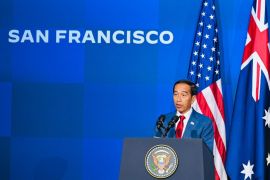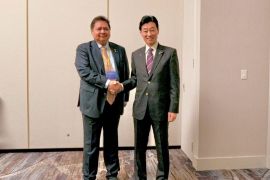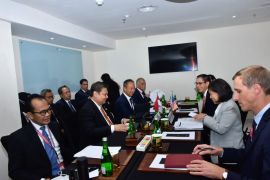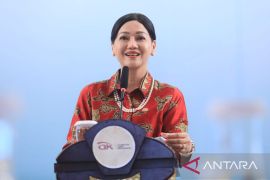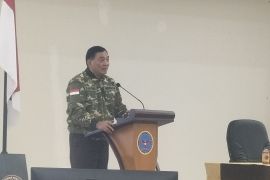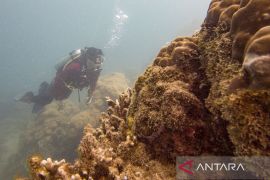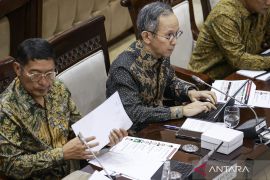First, IPEF must deliver concrete and mutually beneficial cooperation. Second, be inclusive to all countries within the Indo-Pacific region. Third, IPEF should not create new development challenges. Last, encourage synergy between IPEF and other regiShanghai (ANTARA) - The US-led multilateral framework in the Indo-Pacific has grabbed the attention of various stakeholders within the region.
The Indo-Pacific Economic Framework (IPEF) -- launched by US President Joe Biden in Tokyo -- encompasses 13 countries within the region, comprising Australia, Brunei, India, Indonesia, Japan, Republic of Korea, Malaysia, New Zealand, the Philippines, Singapore, Thailand, and Vietnam.
In stark, the 13 countries within the IPEF sphere account for 40 percent of the global GDP. Although the IPEF has yet to establish itself as a tangible partnership, such as an FTA, it has cemented the US’ intention of cooperating with countries within the Indo-Pacific.
Indonesia is certainly no foreigner to both multilateral and bilateral economic partnerships. Indonesia has proactively engaged in the establishment of the Regional Comprehensive Economic Partnership (RCEP), the largest FTA in the world. Within the ASEAN, Indonesia has substantial significance within the ASEAN framework of economic partnerships.
Bilaterally, Indonesia fosters its close trade and investment partnerships with its closest and largest partner, China. Therefore, perhaps, an interesting question that might arise is “What different will the US-led partnership do?”
Essentially, it is crucial to apprehend the Indo-Pacific region. Indonesia recognizes the importance of maximizing the potentials of the Indo-Pacific region to its furthest and most feasible threshold.
Related news: US to intensify security in Indo-Pacific: Blinken
Fundamentally, the Indo-Pacific region is arguably referred to as the most dynamic region among other regions in the world. In view of the vastness of the Indo-Pacific, it contributes to the significance of the population and GDP generated in the region. Hence, the region substantially boasts both economic and security concerns.
The variety of stakeholders within the region signals significant opportunities for economic cooperation. Therefore, Indonesia recognizes the vast feasibility of generating mutually beneficial partnerships within the region, especially during the current times of global recovery from COVID-19.
On the dawn of the IPEF, Indonesia has firmly stated its priorities in this partnership as was echoed in the statement of its Minister of Trade, Muhammad Lutfi, “First, IPEF must deliver concrete and mutually beneficial cooperation. Second, be inclusive to all countries within the Indo-Pacific region. Third, IPEF should not create new development challenges. Last, encourage synergy between IPEF and other regional frameworks, especially the ASEAN Outlook on the Indo-Pacific.”
Furthermore, Minister Lutfi highlighted Indonesia’s inclusivity by stating that the Indo-Pacific is too huge for the benefit of certain countries.
Earlier, the US had more significant ties with the Indo-Pacific region through “the Pivot to Asia” under the Obama Administration. Amid the Pivot to Asia policy, the US introduced the Trans-Pacific Partnership (TPP) as an economic partnership within the region.
Related news: Widodo, Biden discuss issues on Indo-Pacific geopolitics: Hartarto
Regardless of the retraction of the TPP, the US is quite familiar with Indo-Pacific geo-economics. However, as global events develop and administrations change overtime, new economic practices in the context of the IPEF can be expected.
Perhaps, contemporary trade agreement and investment practices within the region are expected to come.
Through this event, it can be perceived that the US is utilizing the IPEF as a platform to promote multilateral partnership under the US architecture to balance—or to a certain extent, contest—China’s multilateralism in the region. Nonetheless, Indonesia does not act with the basis of siding with China or the US.
Referring back to Indonesia’s independent and active foreign policy, it remains clear that Indonesia does not ‘choose’ its partners or who they side with. Rather, it is essential to understand that Indonesia’s foreign policy enables it to choose in keeping with national interests and without discriminating any actor.
“In order to contribute, Indonesia’s diplomacy must be anticipative, adaptive, and agile,” Indonesian Minister of Foreign Affairs, Retno L. P. Marsudi, had noted in her annual press statement in 2021.
Considering how dynamic the Indo-Pacific region is, it is imperative for Indonesia to adapt to the dynamics and changes within the region.
Learning from past events, especially since the COVID-19 pandemic struck, continuously redefining diplomacy and advance norms settings holds significant importance in order to manage the unprecedented.
Related news: US strategic partner for ASEAN in Indo-Pacific region: Marsudi
Hence, the IPEF enables Indonesia to seek bigger economic opportunities and a more inclusive economic cooperation with various countries in the region.
As a member of the IPEF, Indonesia's position implies that it is in the middle of two contesting powers: the US and China.
Regardless of the grounded economic architecture of China within the region, a newly birthed US-led partnership should not be overlooked. Taking into account the US’ role and interest in the Indo-Pacific, the IPEF will certainly contribute new dynamics within the region in an economic manner.
Hence, Indonesia should utilize the membership to further economic ties with the US. In view of the rivalry between the US and China, Indonesia navigates itself between the two primarily through cooperation. Moreover, Indonesia continues to make efforts to maintain regional stability.
Upholding regional cooperation serves as one of the most predominant interests of Indonesia. Through the statements of Minister Lutfi, Indonesia has maintained its serious intention to promote inclusivity.
Related news: RI, Japan discuss cooperation for maintaining peace in Indo-Pacific
The Indo-Pacific, as a region with vast potentials for both developed and developing countries, upholding synergy is imperative.
Indonesia's priorities in the IPEF enable it to serve as a bridge with various countries in the region.
Potentially, Indonesia can act as a bridge and further synergize with other developing countries in the region.
This can lead to the promotion of regional development and capacity building that bolster the ASEAN Outlook on Indo-Pacific. Consequently, not only can Indonesia utilize this opportunity to maintain regional cooperation but also strengthen economic relations with member states and other neighboring developing countries. Indonesia should continue to maximize its role in the IPEF. It is imperative to recognize the importance of the IPEF in Indonesian diplomacy.
Furthermore, considering the diplomatic momentum of Indonesia, the IPEF will serve as one of Indonesia’s focal points to augment the momentum. In the near future, Indonesia will serve two highly important multilateral settings -- the 2022 G20 Presidency and the coming 2023 ASEAN Chairmanship -- with broadly, both being pivotal events for Indonesian diplomacy.
Subsequently, by substantiating the roles of Indonesia’s diplomacy in various multilateral frameworks, in this case, the IPEF, the mutual trust between states will strengthen Indonesia’s integrity in global leadership on coming multilateral frameworks. (INE)
*) Widya Parsaoran Gultom is the Minister Counsellor / Consul of Economy of the Consulate General of Indonesia in Shanghai.
The views and opinions expressed on this page are those of the author and do not necessarily reflect the official policy or position of the ANTARA News Agency.
Related news: Jokowi seeks consistency from Sports Minister in implementing DBON
Related news: Jokowi advises supporters against election haste
Copyright © ANTARA 2022

